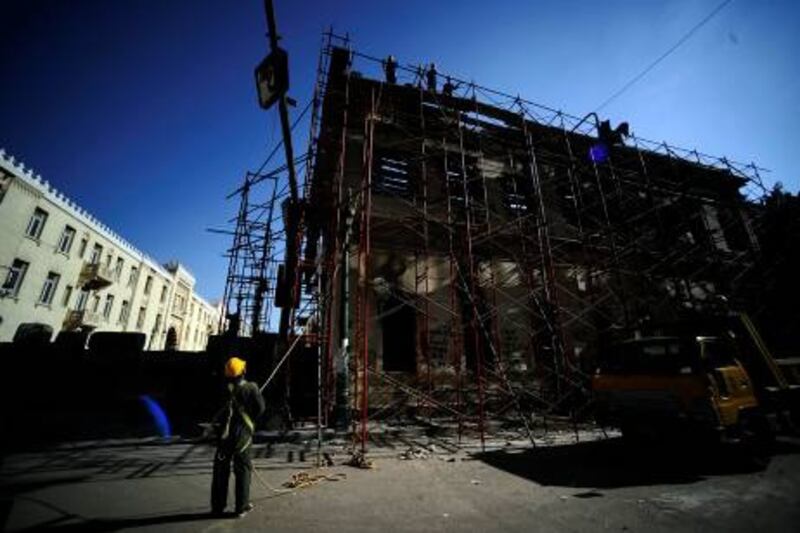Black lacquered walls and crystalline lighting greeted delegates at a London conference touting investment opportunities in Egypt.
For some of those in what the May Fair Hotel calls its "gorgeously opulent" Danziger meeting room, the sales pitch was personal. Wealthy exiles from post-revolutionary Egypt were being invited home by representatives of the country's Islamic government, including Hassan Malek, a leading businessman in the Muslim Brotherhood.
"Most of these investors, they own large projects in Egypt," says Mr Malek, who spoke at the conference. "Their coming back mostly would be a sign of reassurance to others who might want to invest their money here."
The Egyptian president Mohammed Morsi, struggling to reduce an unemployment rate of 12.5 per cent, is wooing the Davos-management savvy of men such as the car and banking investor Yassin Mansour and Hamed El Chiaty, the chairman of the Travco hotel and tourism company. They are among the insiders who fled the collapsing government of Hosni Mubarak.
If they came home, the Mubarak-era tycoons would find a country in a state of political paralysis and economic decay. On January 29, the defence minister Abdelfatah Al Seesi warned continuing turmoil risked "the collapse of the state".
The courtship of the old elite by the new underscores both the political change that has occurred since the revolution and the difficulties involved in rebooting an economy that is growing at an annual rate of less than 2 per cent.
Plummeting foreign direct investment, a stock index at half its 2008 peak and a stalled US$4.8 billion (Dh17.63bn) IMF loan bring urgency to the effort. At the same time, Mr Morsi, who was elected in a vote in which half of Egyptian voters abstained, cannot risk alienating his backers by being seen as allying himself with the business class that benefited from Mr Mubarak's rule. That group's lopsided profits from Egypt's post-2004 economic liberalisation gave free markets a bad name with the public, complicating Mr Morsi's efforts to unshackle the economy.
"We're going to see new people coming up and their businesses flourish. We're going to see people from the old regime bending down and making deals," says Raymond Khalife, a Cairo-based adviser to the chairman of Semiramis Hotels. "And we're going to see people go out of business because they can't get along with this regime."
One fugitive Mubarak backer, Hussein Salem, 79, has offered to settle tax evasion and corruption charges by giving the government half his fortune, his lawyer told the Egypt Independent newspaper.
Still, Magdi Tolba, the chief executive of the exporter Cairo Cotton Center, said he was sceptical whether the government's campaign would work. "They will not come back until they see a different environment," he said. "It's not enough for them to get promises in London. They take the plane and come back and tomorrow they're in jail."
Samir Radwan, the finance minister in the months after the uprising, said the Brotherhood's business allies also lacked the global résumés of the Mubarak-era tycoons. Under the old regime, members of the secretive opposition group were limited to retail or trading businesses of middling rank, forbidden to build the industrial and property empires helmed by Mr Mubarak's well-connected few.
"The group of businessmen around Mubarak were real businessmen and real entrepreneurs and they understood economics," says Mr Radwan, citing the former trade minister Rachid Mohamed Rachid, a former executive vice president of Unilever for the region, as an example. Mr Malek and his counterparts don't "have an economic vision on how to get this country out of this crisis".
Egypt needs help.
To cover its widening budget deficit and replenish dwindling foreign currency reserves, the government requires about $20bn in annual external financing, according to the Institute of International Finance (IIF) in Washington.
Investors are keeping their distance. Foreign direct investment has shrivelled to almost nothing from more than 3 per cent of GDP in 2010, the IIF says. The benchmark EGX30 stock index is down 14 per cent since the January 2011 start of the uprising.
The premium investors demand to hold Egyptian debt over similar-maturity American securities has almost doubled since then. And this week, Moody's Investors Service cut Egypt's bond rating to six levels below investment grade, the fifth reduction in two years.
Egypt's pound is among the 10 biggest decliners in the world against the dollar this year, down 5.4 per cent, and non-deliverable pound forwards show investors expect an additional 8 per cent drop over next three months. Government domestic borrowing costs since the start of the uprising have climbed by about a third.
"Businessmen abroad and investors have a real wait-and-see attitude," says Mohsin Khan, the former head of the IMF's Middle East department. "They're sitting on their hands. They're sitting on their wallets."
What's holding the exiles back is fear. In the two years since Mr Mubarak's downfall, several businessmen and former government ministers have been prosecuted for corruption. The exiles include the former finance minister Youssef Boutros Ghali, 60, and Mr Rachid, 58. Both were tried last year and convicted in absentia.
Cairo is scarred by political tumult, which flared following Mr Morsi's November 22 decree temporarily placing his decisions beyond judicial review. In Tahrir Square, street toughs idly tossing rocks and toddlers coated with filth populate a squalid tent city.
"We haven't had a revolution. We're in a revolution," says Angus Blair, the president of the Signet Institute, a Cairo-based financial research institute.
* Bloomberg News





